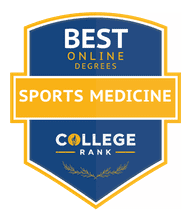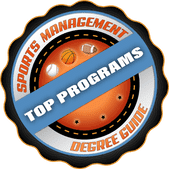Online Master’s in Sports Nutrition With CISSN Certification Prep
Become an expert in sports nutrition today. Guide athletes with evidence-based advice with an MS in Applied Exercise Science, Sports Nutrition concentration from Concordia University Chicago (CUC).
Application Deadline: August 20, 2025
Classes Start: August 25, 2025

#3 Online Master’s in Sports Science
#11 Best Online
College 2024
$575 Per
Credit
Online Master’s Degree Program in Sports Nutrition
Support proper nutrition and reach optimal wellness with a Master’s in Sports Nutrition from Concordia University Chicago.
Sports Nutrition Master’s Concentration Program Details
Admission Requirements
- Bachelor’s degree
- 2.85 minimum GPA
- Objective statement
- Letters of recommendation
The CUC Advantage
A Commitment to Integrity
Integrity lies at the heart of CUC’s ethos. Our faculty, staff and students are dedicated to living authentically, guided by their faith. Within our programs, students are empowered to demonstrate resilience and unwavering commitment to their academic pursuits.
Cost-Effectiveness
Distinguished Faculty
Benefit from the expertise of seasoned faculty members in the field of exercise science. Rest assured, you’ll receive top-tier education from industry leaders.
Institutional Accreditation
Concordia University Chicago is accredited by the Higher Learning Commission to award baccalaureate, master’s and doctoral degrees.
Industry Certification
This program prepares individuals for the Certified Sports Nutritionist (CISSN) exam from the International Society of Sports Nutrition.
Sports Nutrition Career Outlook
The Sports Nutrition concentration is designed for individuals who aspire to provide reliable nutrition information to athletes and physically active individuals. This program emphasizes evidence-based principles in designing and implementing exercise and nutrition programs while interpreting relevant research in the field. By helping athletes reach their peak performance, understanding the science behind nutrition and exercise, promoting overall health and well-being and contributing to sports and exercise research, graduates will play a vital role in enhancing athletic performance and reducing the risk of chronic diseases. Furthermore, this degree offers flexibility in career choices, allowing graduates to explore diverse paths, including consulting, nutrition education and writing for sports publications, while gaining professional recognition in a competitive job market.
Potential Careers
- Sports Nutritionist: Work with athletes and active individuals to develop customized nutrition plans that enhance performance, improve recovery and support overall health.
- Dietitian for Professional Sports Teams: Collaborate with coaches and medical staff to design and implement nutrition programs that optimize athletes’ performance and endurance during training and competition.
- Performance Nutrition Consultant: Provide expert nutritional advice to sports organizations, fitness centers and individual clients, helping them achieve specific fitness goals through targeted dietary strategies.
- Researcher in Sports Nutrition: Conduct research on the effects of diet and supplementation on athletic performance, body composition and recovery, contributing to the advancement of sports nutrition science.
- Corporate Wellness Nutritionist: Design and deliver nutrition programs within corporate wellness initiatives, focusing on improving employee health, productivity and overall well-being through balanced diets and healthy eating habits.
Lock in Your Tuition!
As long as there are no interruptions in your course of study, we guarantee your tuition will remain the same and never increase while earning this degree. This guarantee ensures a stable and predictable investment in your education.
Don’t miss out on our Tuition Guarantee – enroll today!
Student Testimonials
“The professors are super helpful. Two of my professors who were very meaningful to me were also athletic trainers. They would meet every few weeks and talk about the coursework and my job.Get to know your professors. They can help you with day to day or even land a job. Send an introductory email so stand out as a student. You can get to learn about how they are experts in their field.”
“Make that commitment that once you’re going to start the program that you are going to be dedicated to completing it and finishing it.”
“Be committed to see it through and give 100% because that’s really how you’re going to be able to take what you learn and apply it into a career setting.”
“It’s hard to get your masters and be a mom, to be working full time. But it’s a great sense of ‘yeah I did that, while working a full time job, it’s rewarding”.I would say Concordia and getting my masters was the jumpstart of what made me great today.”
“CISSN I passed with flying colors and I got over a 90%.” Getting your Masters degree prepares you to be an auto mechanic. When you get your Masters you learn how to build the car so it teaches you how to understand the scientific principles very deeply that surround these certifications.
I will tell you that it improved my practice a hundred times over just having a really strong grip on the scientific foundations that builds the certification. I was balancing 5 kids and owning a gym. The professors are good at working with adults who are working. The program is entirely doable and designed for working adults and that’s why you choose asynchronous online education.
A big thank you to all the amazing professors I had in my time at Concordia, I will tell you I really got my money’s worth out of that program. You are going to get out what you put in. If you put in the work you will reap the reward. You will make the connections you need to make. You will learn what you need to learn to be a better practitioner”
MS Applied Exercise Science – Sports Nutrition Concentration
“The online format allows for me to continue expanding my business and professional goals while still pursuing a Master’s degree. I was initially worried as I had not previously had much experience with online coursework, but the format allows for structured, discussion based learning amongst peers.”



